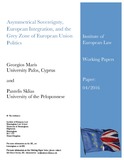| dc.contributor.author | Maris, Georgios | |
| dc.contributor.author | Sklias, Pantelis | |
| dc.date.accessioned | 2016-11-11T10:26:58Z | |
| dc.date.available | 2016-11-11T10:26:58Z | |
| dc.date.issued | 2016-04 | |
| dc.identifier.uri | http://hdl.handle.net/11728/8903 | |
| dc.description.abstract | This study highlights both the significance and impact of the developing changes in the last decades around Europe, the notion-related adjustments that remain to be carried and in parallel to provide a more general explanation concerning the institution of sovereignty in relation to the process of European integration. The main questions that this article seeks to answer are the following: Who governs who within the EU? How does the European nexus of institutions and governance affect sovereignty? Which are the main consequences of the Maastricht’s framework in relation to sovereignty? In order to provide an answer to the above questions, we intend to analyze the relationship of the institution of sovereignty and the ability of exercising independent economic policy within the EMU as well as reexamine the development of this relationship in close regard to the process of European integration. The major contribution of this research is that offers a complementary study in order to understand better the relationship between European integration and state sovereignty. This research integrates sovereignty in the current debates, and
provides an exegesis not only for the main factors that affect the transformation of the EMU but also for the limits of the European integration. | en_UK |
| dc.language.iso | en | en_UK |
| dc.rights | © The Author(s) | en_UK |
| dc.rights.uri | http://creativecommons.org/licenses/by-nc-nd/4.0/ | en_UK |
| dc.subject | Sovereignty | en_UK |
| dc.subject | European Integration | en_UK |
| dc.subject | EMU Governance | en_UK |
| dc.subject | Economic Governance | en_UK |
| dc.title | Asymmetrical Sovereignty, European Integration, and the Grey Zone of European Union Politics | en_UK |
| dc.type | Working Paper | en_UK |


